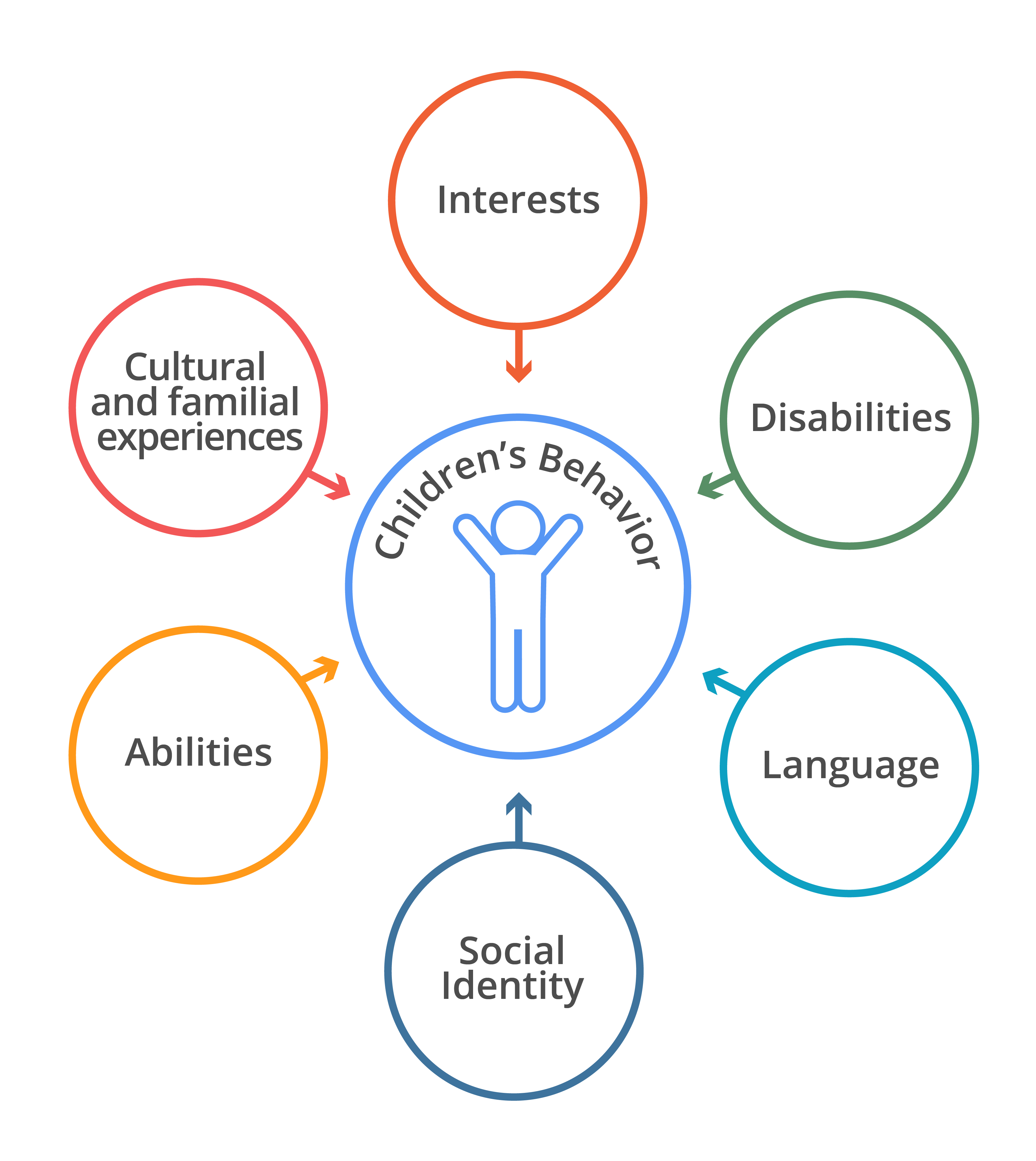作为专业的照顾者,您将在您的工作中遇到具有挑战性的行为,并且必须准备回应。发展的促进适当的行为,如具有挑战性的行为,由成年人定义,每个孩子都是独一无二的。In this course you will have an opportunity to reflect on how your beliefs affect your responses to children’s behavior, learn a systematic way to ensure all children receive social-emotional support, and acquire strategies to ensure that children with behavior that is unresponsive to universal and targeted support get the help they need for optimal learning and development.
辅助标签
- 定义具有挑战性的行为。
- 审查普通童年行为。
- 了解发展的适当行为。
- 描述观察,反思和重新评估。
学
知道
Defining Challenging Behavior
专业护理是一个有益但要求苛刻的工作,并应对具有挑战性的行为是您将面临的需求之一。个人对儿童发展,文化和信仰的了解,所有人都会影响人们如何定义具有挑战性的行为。虽然几乎所有人都有一些人都同意挑战(例如,摧毁财产,伤害自我和他人,欺凌,有问题的性行为),大多数行为都没有挑战或不具有挑战性。史密斯和福克斯定义了具有挑战性的行为,“任何重复的行为模式......干扰或受到干扰儿童最佳学习或与同行和成年人的亲社会互动的风险”的风险“(2003)。yabo电子游艺请注意,此定义广泛且开放,以解释,而不是咬人或击中等特定行为的列表。要探索这一点,让我们首先思考仔细观察亲社会行为。
亲社会行为始于孩子们能够分享玩具或说“请”和“谢谢”。将亲社会行为视为积极,建立的关系互动,或者更普遍作为帮助孩子繁荣到情感智能生物的行为。重要的互动在出生时开始,孩子需要培养和反应的关系来学习亲社会行为。您将在本课程中的两个课程中了解有关培养和响应关系的更多信息,也可以参考社会和情感发展和积极的指导课程。
亲社会行为和关系建设互动没有普遍定义;他们的意思是没有清除。考虑您关心的儿童的不同家庭和文化规范以及如何影响孩子对关系的理解。例如,当有些家庭共度时光,他们通过加热辩论,彼此交谈,并为彼此的想法演奏“魔鬼的倡导者”。这就是他们如何互相居住的生命。在这种类型的家庭文化中,太多的一致或与他人的流动进行了思想,被视为缺乏兴趣和关怀。来自家庭的儿童,这是常规可以以这种情况与其他孩子和员工相互作用,同时在您的计划中,因为这是他们在家里的体验。如果这不是您的文化或家族体验,您可以将这种行为解释为敌对或不尊重,您可能会将其视为具有挑战性的行为。如果这与您的经历更像,您可以更全面地了解这种类型的互动如何加强在这种文化背景中的关系。
常见的童年行为
你可能有英语熟悉“可怕的两个”阶段,苛刻的学龄前儿童,以及来自Tweens的粗鲁返回谈话。亚慱彩票虽然这些行为可能对某些护理人员有挑战性,但他们是儿童的典型和通过积极的指导和基于关系的支持来解决的最佳。行为沟通了关于孩子们认为和感受的消息,并反映了他们的环境。请记住,人,实践,活动,文化,偏见,物理设计和常规都构成环境。
You should expect for children to engage in some “difficult” behavior, and you can think of this as developmental progress or children learning new skills. For example, during the transition from infancy to toddlerhood, most children are no longer satisfied with only playing with the toys and objects within their immediate reach. Instead toddlers are busy beings who explore their environments and show their independence by “testing” limits and often resisting help. This can be particularly challenging for some caregivers. Understand that this type of behavior, while it may feel challenging, is necessary for children to learn to problem-solve and develop secure attachments. Review other examples of developmentally appropriate behaviors in the chart below, and think about the skills or understanding children gain from each.
Age Group |
Developmentally Appropriate Behavior |
|---|---|
前移动婴儿 |
|
Mobile infants |
|
幼儿 |
|
亚慱彩票学龄前儿童 |
|
年轻学龄儿童 |
|
Older school-age |
|
Developmentally Appropriate Behavior: More than Milestones
The chart above describes common examples of developmentally appropriate behavior, however; it is impossible to list the entire wide-range of typical behaviors that are the result of children’s diverse experiences. You can find developmental milestone information throughout the Virtual Lab School, but developmentally appropriate behavior is more than the milestones children typically achieve at specific ages. While milestones are important to know, children’s abilities, disabilities, social identities (race, ethnicity, and gender, among others), cultural and familial experiences, interests, and languages all affect their behavior. If you think about these factors, every child in your program has a unique profile; therefore, developmentally appropriate behavior is specific to each child (National Association for the Education of Young Children, 2019). This means that behavior that is developmentally appropriate for one child may not be for all children.

让我们使用语言多样性来思考有关发育适当行为的个人性质。您可能会照顾来自讲英语或西班牙语和其他语言的多语种家庭的儿童。有时候,特别是如果这些儿童在长时间访问非英语的环境中访问家庭,那么多语种子女可能只会在返回主要英语环境之类的父母节目等时讲家庭的家庭语言。他们可能拒绝回应英语问题和请求,或者仅在他们的家用语言中响应。虽然这是多种语言儿童的发展适当行为,但没有这种知识的护理人员可能会感到沮丧,并认为这是挑战性的行为。这种相同的行为,拒绝在能够这样做时发言,通常在单塞林儿童方面没有典型或发育。您能想到其他例子,其中对儿童行为的期望是不同的吗?
当你在关心中反思每个孩子的独特性时,也会考虑自己的独特性。有助于您的开发和学习的因素以及您的特定计划的文化影响您对儿童行为的看法以及您的回应方式。yabo电子游艺当您完成本课程时,反思您自己的能力,残疾,社会身份,文化和家庭体验,兴趣和语言。
Balancing Act: Consistent Program Expectations and Diverse Family Practices
虽然你应该了解孩子的家庭做法和期望,但在他们家的同时,对于在您的计划中具有清晰和一致的期望,对儿童行为的预期同样重要。Though most children, with time and support, can learn to flexibly shift based on the specific environment they are in (home versus child care program), your thoughtful guidance is necessary to help them understand different expectations in ways that respect families’ beliefs, culture, and identities. This guidance is key to using developmentally appropriate practice to prevent challenging behavior.
Sometimes, child care staff may interpret developmentally appropriate practice to mean that you must cater your care of each child to the varied opinions of their families. However, this is not an either or situation, and your program can do both—it can respect family values and have clear program expectations. Use what you know about families to inform your understanding of为什么孩子们参与某些行为,因此您可以帮助他们满足您的计划期望。寻找您的计划领导,以帮助指导对家庭的计划期望的沟通。除了简单地了解具体规则外,专注于帮助家庭了解为什么这些期望存在。
看
没有一个普遍的定义或具有挑战性的行为列表,并且在其环境的背景下发生儿童的行为。尽管是发展的正常部分,但某些行为可能对一些护理人员感到挑战。当您倾听视频中的专家时,反思您对儿童的期望以及您的期望如何影响您定义具有挑战性的行为。
挑战性行为:介绍
Behaviors in the Context of Culture
做
观察,反思和重新评估:支持儿童和青少年的钥匙
后来的课程进一步深入研究如何具体观察和应对具有挑战性的行为,而是知道观察,反思和重新评估是有价值的战略照顾所有儿童和所有类型的行为。
- 观察allows you to think about children’s behavior without bias or opinion and determine, “What happened?”
- Reflection帮助您了解为什么行为发生以及儿童的特定环境和经验如何影响其行为。要反映,问问自己这些问题:
- What do I know about child development and learning?
- 我对个人孩子了解什么?
- 我如何了解我关心的孩子的社会和文化背景,我和我的计划?
- 重新评估,还讨论了教师的社会情感学习yabo电子游艺课程是能够以不同的方式考虑情况并掌握您的观点。你可能会想到重新评估,因为看到玻璃半满而不是半空。For example, if a teacher feels that a child’s behavior makes them feel frustrated, reappraisal of this thought might look like this: “This behavior is an opportunity to help this child learn and for me to grow my ability to support children through even the most challenging situations.”
知道这些策略不仅在存在挑战时使用,而且还可以帮助您考虑导致所需的结果或行为。无论您是支持有挑战性的行为还是思考如何帮助孩子成功或学习新技能,使用这些策略指导您的工作。
完成本课程
有关本课程期望和随附的学习,探索和应用资源和在整个课程中的活动的更多信息,请访问具有挑战性的行为课程指南。
请注意引用和参考资料部分the end of each lesson outlines reference sources and resources to find additional information on the topics covered. As you complete lessons, you are not expected to review all the online references available. However, you are welcome to explore the resources further if you have interest, or at the request of your trainer, coach, or administrator.
Explore
阅读方案发展适当的行为:案例研究。然后完成问题发展适当的行为:反思activity and discuss your thoughts with a colleague.
申请
分享此讲义有挑战性行为的儿童与家庭引导他们对孩子的行为和发展的理解。
词汇表
| 学期 | Description |
|---|---|
| 发展适当的做法 | 故意决定认为,早期儿童教育工作者和其他专业人员促进每个和每个孩子的最佳开发和学习yabo电子游艺 |
| 种族 | A large group of people who have the same national, racial, or cultural origins, or the state of belonging to such a group |
| 多语种孩子 | 使用多种语的孩子 |
| 单晶女 | 说一种语言的孩子 |
| 种族 | 人的自我识别与一个或多个社会团体,如白人,黑人或非洲裔美国,亚洲,美国印第安纳州和阿拉斯加本土,原住民夏威夷和其他太平洋岛民,或其他一些比赛 |
| 重新评估 | 认知改变情绪调用情况或以不同方式思考情况的含义 |
证明
Center for the Social and Emotional Foundations for Early Learning (CSEFEL). Retrieved fromhttp://csefel.vanderbilt.edu/index.html
Centers for Disease Control and Prevention. (n.d.). CDC’s Developmental Milestones. Retrieved fromhttps://www.cdc.gov/ncbddd/actearly/milestones/index.html.
幼儿师的司。(2017)。关于挑战性行为和幼儿的立场陈述。华盛顿特区:作者。从...获得https://www.decdocs.org/position-statement-challenging-beha
Hepach,R.&Warneken,F。(2018)。编辑概述:早期发展的女性行为:揭示人类Prosociality的基础。心理学目前的意见那20。
关于发展适当做法的Naeyc立场声明:2019(草案)。从...获得https://www.naeyc.org/sites/default/files/gobally-shared/downloads/pdfs/get-involde/leadershile/initial_public_draft_dap_2019.pdf.
Smith, B., & Fox, L. (2003). Systems of service delivery: A synthesis of evidence relevant to young children at risk of or who have challenging behavior. Tampa, FL: Center for Evidence-Based Practice: Young Children with Challenging Behavior.





